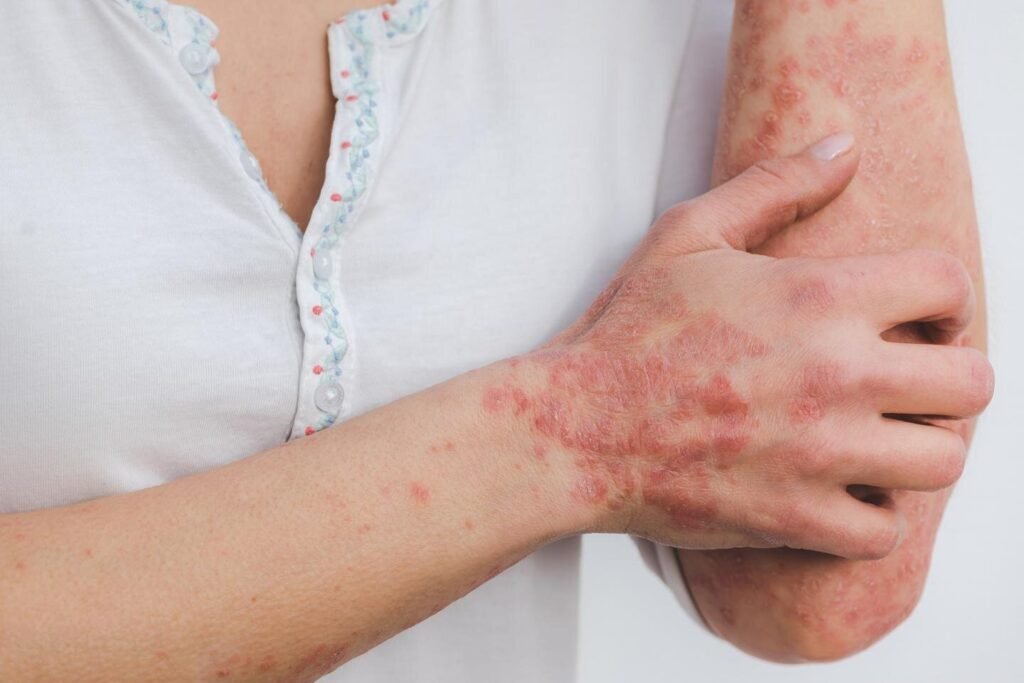A recent study conducted by researchers at King’s College London has revealed that a diet rich in fruits and vegetables, whole grains, low-fat dairy foods, and lean meats, low in salt and sugar, is linked to reduced severity of psoriasis.
Published in the British Journal of Nutrition, the study explored the relationship between diet quality and the severity of psoriasis. The findings offer new insights into how dietary patterns can impact psoriasis severity in non-Mediterranean populations.
Psoriasis is a chronic inflammatory skin condition characterized by flaky skin patches that develop scales. It affects millions worldwide and is believed to be caused by immune system dysregulation.
The research analyzed data from 257 adults with psoriasis who completed an online survey. Participants’ adherence to various diet quality scores, such as the Mediterranean Diet Score, the Dietary Approaches to Stop Hypertension (DASH) score, and the Healthy Plant-based Diet Index, was assessed using a food frequency questionnaire. Psoriasis severity was self-assessed using a validated questionnaire.
The study revealed that individuals with very low adherence to the DASH diet index and the Healthy Plant-based Diet Index were more likely to report higher psoriasis severity.
Further analysis showed that higher intake of red and processed meats was associated with more severe psoriasis, independent of body mass index (BMI). Conversely, increased intake of fruits, nuts, and legumes was linked to less severe psoriasis, although this relationship was influenced by BMI.
The study, part of the Asking People with Psoriasis about Lifestyle and Eating (APPLE) project, highlighted the potential benefits of dietary interventions in improving patient outcomes. Sylvia Zanesco, a Ph.D. student from the Department of Nutritional Sciences at King’s College London, emphasized the importance of incorporating dietary assessments into routine care to support patients in managing their condition.
The DASH diet, originally designed to lower blood pressure, emphasizes fruits, vegetables, whole grains, low-fat dairy foods, and lean meats while limiting salt, sugar, and saturated fats. A high Healthy Plant-based Diet Index signifies a dietary pattern rich in healthy plant foods and low in animal and unhealthy plant foods.
Professor Wendy Hall, senior author of the study and Professor of Nutritional Sciences at King’s College London, underscored the potential role of dietary advice in managing psoriasis symptoms alongside standard clinical care. Future research will explore whether diets rich in healthy plant foods can alleviate psoriasis symptoms in a controlled clinical trial.
The study’s findings contribute to the growing evidence supporting dietary modifications as a complementary strategy in psoriasis management to improve disease severity and enhance patients’ quality of life. Dr. Thivi Maruthappu, a consultant dermatologist involved in the study, highlighted the importance of addressing patients’ questions about the impact of diet on their skin.
More information:
Sylvia Zanesco et al, Associations between diet quality indices and psoriasis severity: results from the Asking People with Psoriasis about Lifestyle and Eating (APPLE) cross-sectional study, British Journal of Nutrition (2025). DOI: 10.1017/S0007114525000340
Citation:
Plant-rich, low saturated-fat diet associated with reduced psoriasis severity (2025, February 21)
retrieved 21 February 2025
from https://medicalxpress.com/news/2025-02-rich-saturated-fat-diet-psoriasis.html
This document is subject to copyright. Apart from any fair dealing for the purpose of private study or research, no
part may be reproduced without the written permission. The content is provided for information purposes only.


